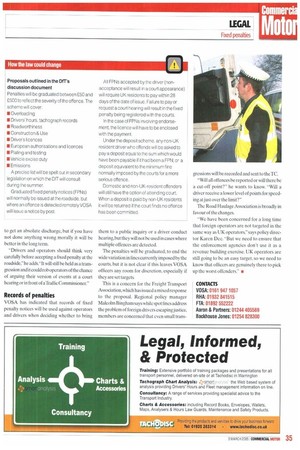How the law could change
Page 37

If you've noticed an error in this article please click here to report it so we can fix it.
Proposals outlined in the DfT's discussion document Penalties will be graduated between £50 and £500 to reflect the severity of the offence. The scheme will cover: • Overloading • Drivers' hours, tachograph records • Roadworthiness • Construction & Use • Driver's licences • European authorisations and licences • Plating and testing
• Vehicle excise duty
• Emissions A precise list will be spelt out in secondary legislation on which the DfT will consult during the summer.
Graduated fixed penalty notices (FPNs) will normally be issued at the roadside, but where an offence is detected remotely VOSA will issue a notice by post.
All FPNs accepted by the driver (nonacceptance will result in a court appearance) will require UK residents to pay within 28 days of the date of issue. Failure to pay or request a court hearing will result in the fixed penalty being registered with the courts.
In the case of FPNs involving endorsement, the licence will have to be enclosed with the payment.
Under the deposit scheme, any non-UK resident driver who offends will be asked to pay a deposit equal to the sum which would have been payable if it had been a FPN; or a deposit equivalent to the minimum fine normally imposed by the courts for a more serious offence.
Domestic and non-UK-resident offenders will still have the option of attending court. When a deposit is paid by non-UK residents it will be returned if the court finds no offence has been committed.










































































































































































































